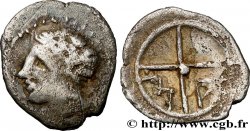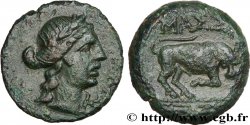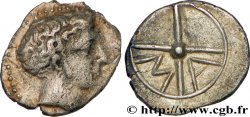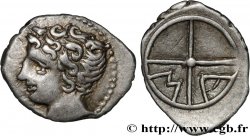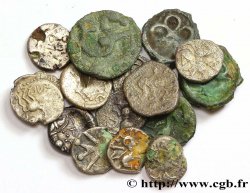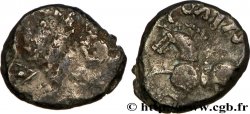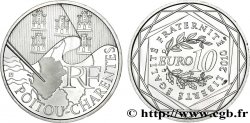v34_1161 - MASSALIA - MARSEILLES Trois quarts de Litra au casque ionien à droite sans volute, du type du trésor d’Auriol
MONNAIES 34 (2008)
Начальная цена : 650.00 €
Назначить цену : 1 200.00 €
Цена реализации : 650.00 €
Количество ставок : 1
Максимальная предлагаемая цена : 726.00 €
Начальная цена : 650.00 €
Назначить цену : 1 200.00 €
Цена реализации : 650.00 €
Количество ставок : 1
Максимальная предлагаемая цена : 726.00 €
Тип Trois quarts de Litra au casque ionien à droite sans volute, du type du trésor d’Auriol
Дата: c. 480-470 AC.
Монетный двор / Город: Marseille (13)
Металл: silver
Диаметр: 10 mm
Вес: 0,96 g.
Редкость: R3
Комментарии о состоянии
Flan large et frappe parfaite au droit comme au revers. Très agréable patine sombre et brillante de médaillier
Ссылки в каталоге: :
Происхождение:
Cette monnaie provient de la collection T., vendue par A. Weil, à Evreux, n° 162
Лицевая сторона
Аверс: легенда: ANÉPIGRAPHE.
Аверс: описание: Casque ionien à droite.
Обратная сторона
Реверс: легенда: ANÉPIGRAPHE.
Реверс: Описание: Carré creux irrégulier.
Комментарий
Obole au casque ionien à droite sans volute, du type du trésor d’Auriol. Cette monnaie, tout en étant nettement plus belle, est très proche du n° 848 de MONNAIES XXIV, vendue 535 € sur un ordre de 600 € avec six ordres ; aucune liaison de coin n'est à signaler entre ces deux monnaies.
La série N Furtwängler est dite "au casque ionien" mais ont une palmette sur le casque et sont trop légères ; tous les exemplaires décrits ont un poids qui varie entre 0,56 et 0,65 gramme. Avec un poids de 0,96, il semble qu'elle corresponde à trois-quarts de litra. Serait donc le seul second exemplaire connu après celui passé dans MONNAIES XXUV. La monnaie N23 est d'un poids relativement lourd pour la série, et d'un style différent des autres monnaies du groupe N ; elle se rapproche de nos deux monnaies !.
Obol with Ionian helmet to the right without volute, of the type from the Auriol treasure. This coin, while being clearly more beautiful, is very close to No. 848 of MONNAIES XXIV, sold for €535 on an order of €600 with six orders; no die link is to be reported between these two coins. The N Furtwängler series is called \\\"with the Ionian helmet\\\" but has a palmette on the helmet and is too light; all the examples described have a weight that varies between 0.56 and 0.65 grams. With a weight of 0.96, it seems that it corresponds to three-quarters of a litra. It would therefore be the only second known example after the one passed into MONNAIES XXUV. The N23 coin is relatively heavy for the series, and of a different style from the other coins of the N group; it is close to our two coins!
La série N Furtwängler est dite "au casque ionien" mais ont une palmette sur le casque et sont trop légères ; tous les exemplaires décrits ont un poids qui varie entre 0,56 et 0,65 gramme. Avec un poids de 0,96, il semble qu'elle corresponde à trois-quarts de litra. Serait donc le seul second exemplaire connu après celui passé dans MONNAIES XXUV. La monnaie N23 est d'un poids relativement lourd pour la série, et d'un style différent des autres monnaies du groupe N ; elle se rapproche de nos deux monnaies !.
Obol with Ionian helmet to the right without volute, of the type from the Auriol treasure. This coin, while being clearly more beautiful, is very close to No. 848 of MONNAIES XXIV, sold for €535 on an order of €600 with six orders; no die link is to be reported between these two coins. The N Furtwängler series is called \\\"with the Ionian helmet\\\" but has a palmette on the helmet and is too light; all the examples described have a weight that varies between 0.56 and 0.65 grams. With a weight of 0.96, it seems that it corresponds to three-quarters of a litra. It would therefore be the only second known example after the one passed into MONNAIES XXUV. The N23 coin is relatively heavy for the series, and of a different style from the other coins of the N group; it is close to our two coins!








 Cообщить об ошибке
Cообщить об ошибке Распечатать страницу
Распечатать страницу Отправить мой выбор
Отправить мой выбор Задать вопрос
Задать вопрос Consign / sell
Consign / sell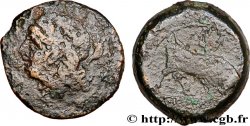
 Информация
Информация